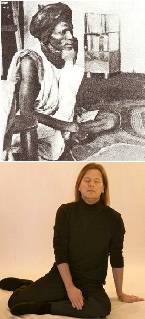 As part of the process of verifying the effects of the specific postures, Dr. Goodman conducted controlled experiments. She worked with individuals, one on one, to remove influences of a group experience. She carefully documented the results and then looked for patterns looking for similar experiences specific to each posture. No-one experiences the same journey, but the experiences seems “cut of the same cloth” specific to the posture. This is where it became clear that an undeniable pattern exists for each posture.
As part of the process of verifying the effects of the specific postures, Dr. Goodman conducted controlled experiments. She worked with individuals, one on one, to remove influences of a group experience. She carefully documented the results and then looked for patterns looking for similar experiences specific to each posture. No-one experiences the same journey, but the experiences seems “cut of the same cloth” specific to the posture. This is where it became clear that an undeniable pattern exists for each posture.
Nupe Mallam Posture. One of the first set of postures that Dr. Goodman used in her early experiments. The Nupe Mallam posture is a “divination” pose of the Nupe tribe, a tribe in sub-Saharan Africa. Mallam is the word for “diviner” among the Nupe and this posture was used by Nupe Mallam diviners. As a divination posture, it provides a wide, all-encompassing perspective on a current issue or problem.
Description: Some describe this posture as similar to sitting in meditation, except that the legs are both tucked under the body, turned to the right side. Sit on the floor, leaning toward your left and supported by your left arm. Hold your left arm rigid, with your hand at a right angle to your body. Place your left hand at a spot three to five inches to the left of your body and just behind a straight line drawn along your back. Bend both legs at the knees with both feet pointing to the right, positioned so that the sole of your left foot is resting just to the left of your right knee. Place your right hand on your lower left leg, where the muscle indents about halfway down your calf. Move your head slightly to the left, so you are looking over your left knee, and close your eyes. Because some students have problems with their knees, Dr. Goodman also experimented with the mirror image of this posture – leaning to the right instead. She found it equally as effective. One should have a a clear intent as the drumming and/or rattling begins. As always we welcome reports of your experiences which we will add to our research database. We always keep personal information confidential. Send experiences to experiences@cuyamungueinstitute.com
